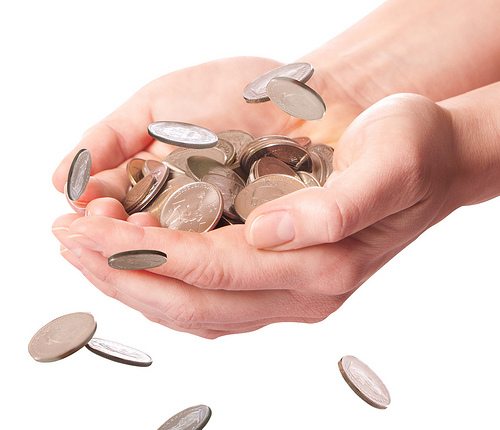

Economy
Introducing… Good Money Week
So, what is Good Money Week? Good Money Week is an annual campaign coordinated by the UK Sustainable Investment and Finance Association (UKSIF) to raise awareness of sustainable, responsible and ethical investment and finance opportunities among the public and their financial advisors.
Blue & Green Tomorrow is currently running a crowdfunder to ensure its survival. Please pledge.
With events across the country from October 19-25, Good Money Week will bring together individuals, financial advisers, charities, faith, community and student groups and financial institutions, to help everyone have a positive impact on the environment and society while spending, saving, or investing their cash.
Though this is UKSIF’s seventh annual campaign it is the first Good Money Week, following the rebranding of National Ethical Investment Week. With the new moniker comes a new emphasis. UKSIF say this year’s event will shout from the rooftops that everyone – from investment professionals to pension holders and current account customers – can and should make their money do good.
“I want Good Money Week to be inclusive,” says UKSIF chief executive Simon Howard.
“I want it to include every consumer and every financial services company. You don’t have to be a fund manager and you don’t have to be a large bank – service providers, financial advisors, pension funds and individuals are all welcome.”
So what is sustainable and ethical investment?
Investing sustainably and ethically generally means investing according to your values, thinking about environmental, ethical and social factors, when choosing where to put your money. It allows you to make a positive difference in the world while earning a good financial return.
Whichever way you look at it, the amount of wealth that is invested sustainably is growing.
“The market has come a phenomenally long way,” says Will Oulton, global head of responsible investment at First State Investments and an UKSIF board member, who has worked in the space for 14 years.
“When I started there was very little awareness of sustainable and responsible investment in the industry. We’ve gone from a values driven niche market to one now where its much more institutionalised, and there’s much better data around.”
The European Sustainable Investment Forum has revealed that sustainable investment in Europe has grown by almost 23% between 2011 and 2013, outpacing mainstream investment that stood at 21.7%.
Global movements have risen to demand financing be redirected to the renewable energy revolution, with institutions signing up around the world. Over 800 leading global investors have pledged to withdraw $50 billion from fossil fuel corporations over the next five years.
Social impact bonds, community share offers, ethical businesses and similar alternatives grow ever more popular. New responsible investment funds and tools are launched with encouraging regularity.
According to analysts EIRIS, over £12 billion is invested ethically in retail funds in the UK. That is up from just £5.5 billion 10 years ago. Of course, this sum remains a small percentage of assets under managements, but the direction of travel is clear.
Why should you invest sustainable and ethically?
Investing sustainably and ethically means investing according to your values. It means you can avoid investing in firms can manufacture weapons, sell tobacco or exploit their workers.
You can steer clear of fossil fuel firms, boycotting the companies contributing most to climate change and pushing nature to the brink. You can take your money out of the hands of banks that use it irresponsibly, and trust it with banks that use it positively.
Every day in the pages of Blue & Green Tomorrow you will find more reasons to make good money choices. Civilization faces many crises, from resource scarcity and pollution to population growth and inequality. However you invest sustainably or ethically, you make the world a better place.
“[Sustainable investment] offers you, the investor, a new mindset,” writes Richard Essex of Grayside Financial Services in his 2014 book, Invest, Feel Good and Make a Difference.
“You can really start to feel good and involved in your investment rather than a rabbit in headlights, which is what many investors have felt like in the past.”
Plus, doing so does not mean sacrificing financial returns. In fact, it can make you more money. A growing body of evidence indicates that sustainable funds, portfolios and businesses outperform their less discerning peers. Savvy investors are also beginning to recognise that the firms taking sustainability seriously are well-run, lead by long-term thinkers.
Meanwhile, questions have arisen about the future of carbon-intensive investments. As governments attempt to curb climate change and address other critical challenges, the old tried and tested investments might not look such a good bet anymore.
How can you invest sustainably and ethically?
The best way to make your money do good is to visit a specialist adviser. Ethical IFAs can provide expert advice on the investments that will suit you, your risk profile and your values.
But whoever you are, there are so many ways you can invest more positively. If you are, say, a banking customer, use online tools such as Move Your Money’s handy scorecard to shop around for a bank that shares your values. To learn more, find a Good Money Week event near you. And stay tuned to Blue & Green Tomorrow’s coverage throughout the week.
Further reading:
Good Money Week: Barchester Green names top five ethical funds
Eurosif: European sustainable investment market outperforming the mainstream
Financial services report recovery as sustainable investment message spreads
Good Money Week goes live with new website
UKSIF rebrands National Ethical Investment Week as Good Money Week


 Environment12 months ago
Environment12 months agoAre Polymer Banknotes: an Eco-Friendly Trend or a Groundswell?

 Features11 months ago
Features11 months agoEco-Friendly Cryptocurrencies: Sustainable Investment Choices

 Features12 months ago
Features12 months agoEco-Friendly Crypto Traders Must Find the Right Exchange

 Energy11 months ago
Energy11 months agoThe Growing Role of Solar Panels in Ireland’s Energy Future




























